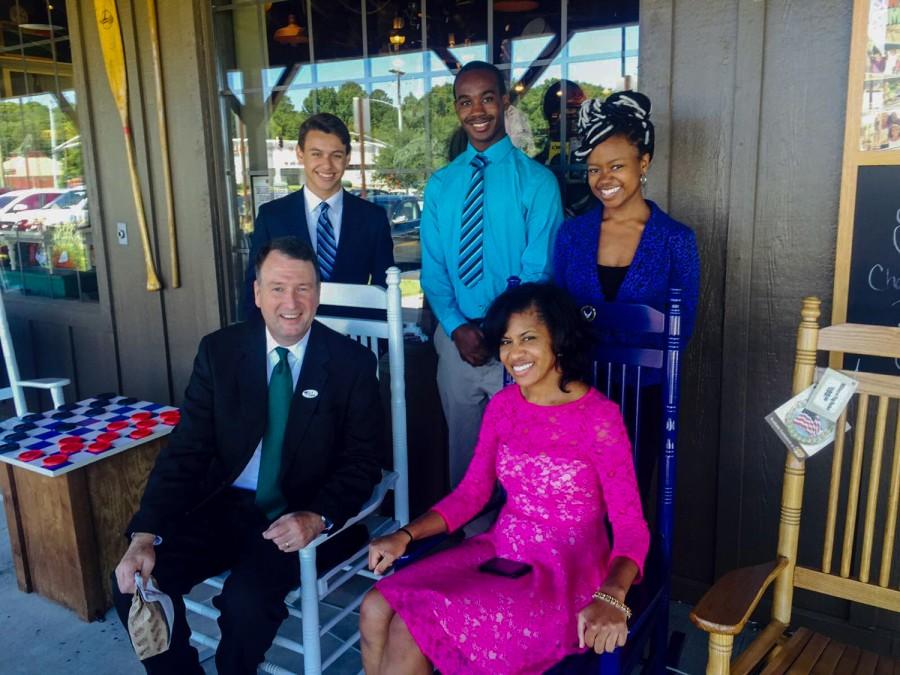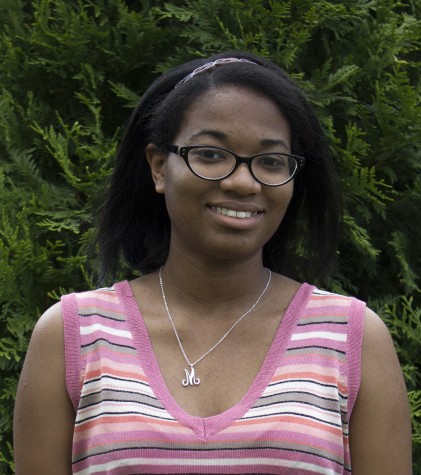My Mentor & I: Part 2
Jasmine King, in blue, posing along with with Judge Kitchens, seated, and other members of the MSMS Mentorship Program
January 11, 2016
In a previous article published by the Vision entitled My Mentor and I, the Mentorship guidelines and goals were published. With the help of Kayla Hester, the Mississippi School for Mathematics and Science mentorship coordinator, The Vision is offering an exclusive three-part series featuring three MSMS Mentorship students and their mentoring experience. MSMS mission statement states: “Our mission is to enhance the future of Mississippi in the global society by meeting the individual needs of gifted and talented students through providing innovative learning experiences and leadership development in a residential environment.” Many at MSMS would consider the mentorship program to be an example of the school’s “innovative learning experience.”
Vicksburg native Jasmine King, a senior, is featured in this week’s edition of The Vision. King offers her personal experience in the mentoring program as well as how it has affected her educationally.
Final Project: Am I Where I am Supposed to be?
by Jasmine King
I first got interested in the legal field when I, at the age of12, witnessed the injustices that are prevalent in society. Due to this, a 17-year-old verison of Circuit Court Judge James T. Kitchens would be very beneficial due to the experience that he has had during his time in court. Having met Judge Kitchens under strained conditions in the Spring of 2015, I gained an understanding that apprenticeship under him might help me truly decide what I want to do with my life. However, I wasn’t really prepared for what was to come within the few months that I would frequently visit the courthouse.
My experiences at the court house were unlike any others that I heard concerning other students under the mentorship program. I was introduced to varying ideas, theories, crimes and people under a short amount of time. Acquainted with varying judges, attorneys, correction officers and bailiffs, I was pulled into the legal system head first. Having the opportunity to read several case files and summaries as well as discussing them with not only Judge Kitchens but Mrs. Lynn Conner and others, I have been able to learn more through their experiences and beliefs. Researching recent and older crimes and convictions, I have been able to distinguish how crimes affect not only criminals but also the communities in which they live. I have learned how to express my feelings towards certain issues in a way that will promote change and better society.
The environment of the courthouse generally depends on the people inside. When you first arrive, there usually are two guards waiting for you to walk through a metal detector. Once you go through the metal detector, all of your bags are checked to ensure to them that you are not a threat to anyone in the building. After all of this, they allow for you to continue on with your planned visit. I only had to do this twice. After passing this test, I always headed upstairs to the Circuit Court chambers which is pass the “Defendant Waiting Room” and the “Circuit Clerk Office.” Once I pass through the usually locked door that allows the view of the Circuit Court Chambers, I usually see a large group of people discussing the events of the day. These people range from the three circuit court judges, the district attorney, the people who work under the district attorney, defense attorneys, legal clerks and secretaries and bailiffs.
As I make my way into the actual chambers/office of the Circuit Court Judge, Mrs. Conner is sitting at her desk doing either arraignments or researching certain cases. Judge Kitchens is either in his chambers or in the court room. There is at least two other people in the room as well, it simply depends on the day. After I tell Mrs. Conner and Brandon, the Circuit Court Law Clerk, about my day, I usually make my way into the judge’s chambers to greet Judge Kitchens. His chamber is full of books organized in the neatest way possible. There are four chairs that run along the same wall that links with the door that heads into the actual courtroom. The judge’s desk is enormous and they just got a new Bluetooth printer that Judge Kitchens installed about a month ago.
Judge Kitchens has a very generous persona. It goes past how he interacts with his colleagues into the courtroom with how he relates to defendants. He speaks to people on a understanding level. It is as if he knows how to talk to everyone in a seemingly perfect way. Having witnessed him the courtroom while he is receiving guilty pleas, I have watched as he transforms from a judge to almost a father-figure when it comes to defendants who have simply made bad decisions. I have seen him be cordial with co-workers but strict with drug addicts. I have witnessed Judge Kitchens be a human being who genuinely cares about the well-being of his community in all of its spectrums. Seeing all of this, seeing someone who can care to that capacity and still be able to differentiate the law between the good in people, has really been a large portion of why I enjoy my mentorship assignment so much.
Judge Kitchens has made a point to have me read several case decisions, sit in his court hearings, sit in Judge Howard’s court hearings, and encounter several different people. He critiqued the literary assessment I wrote concerning the Brian Holliman cases of Lowndes County. Almost every time I visit the courthouse, Judge Kitchens has me read a recent case decision. When I get done reading it, we discuss the case as well as the decision that was made. Once done with this, I am asked if I have any questions. I often have many. I have sat in on many trials ranging from homicide, aggravated assault and medical malpractice. I also have heard numerous guilty pleas. On top of all of this, I meet several different people. I have met Forrest Allgood, Tiffany Jones, Mahala Salazar, Maurice Johnson, Lindsey Clemons and Scott Rogillio. I have even been in the same hallway as a dedicated meth user. Truthfully, there is never a boring day at the courthouse.
Throughout my experience at the courthouse, I have been able to discover things not only about the field in which I have interest in but also about myself. I have learned that I am extremely frightened by the idea of defending heartless criminals, being proven wrong, not being able to help everyone and being in the presence of dedicated drug users. But that fear also lights a flame in me that makes me want to pursue this field even more. This thirst I have to help people can only be quenched through law. I am seeing that now. I’m accepting. In order to do this, I have to build endurance concerning all of my fears. I have to be able to choose my battles. I have to be able to right any wrongs. I have to be ready to fight my hardest for clients, because who else will do so? I have to get used to being around people who are not truly there all of the way. It won’t be easy, but it will be worth it. Truthfully, I am looking forward to it.
During my mentorship experiences, I have gained so many valuable life lessons. I went in expecting to only sit in court and cases that would not be interesting or simply sit in a room doing nothing. However, I have gained a small understanding of the legal world that governs and protects the lives of those in Lowndes County. I have witnessed how laws prevent criminals from hurting more victims. I have watched attorneys speak eloquently and prove their points. I have spoken to some of the best attorneys in the state and have enjoyed every minute of it. I have found my calling. And at this moment in my life, there is nothing that can deter me from it.









